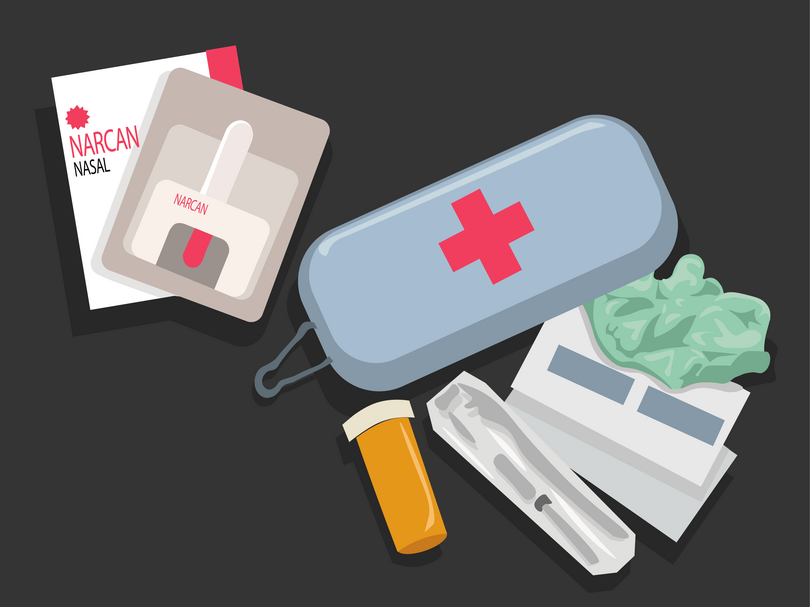In the face of an overdose crisis, SU needs mandatory Narcan training

Nora Benko | Illustration Editor
SU must protect its students amid the overdose epidemic by providing naloxone training, the overdose reversal medication, our columnist writes.
To support student journalism and the content you love, become a member of The Daily Orange today.
Opioid use and overdose is on the rise in the United States and its grip does not spare the city of Syracuse or universities like Syracuse University and SUNY ESF.
Drug use on college campuses is common knowledge, but remains a poorly addressed topic. Many universities are aware that overdoses happen, yet only teach using ineffective, “Just Say No” practices instead of providing physical resources for safety. Rather than trying to stop students from using, if they are serious about saving lives, SU needs to mandate real-life training on how to be safe when partaking and in the event of an overdose.
Naloxone— commonly known by one of its brand names, Narcan — works by blocking opioid receptors in the brain, thus blocking and reversing the effects of opioids in the nervous system. Students and staff can stop the symptoms of an overdose before emergency medical services arrive.
But still, an SU spokesperson told The Daily Orange that Narcan is not currently required to be physically present in buildings. In order for students to be safe on-campus, Narcan needs to be freely accessible at every residence hall and major building at SU. The Barnes Center at the Arch’s staff is also working to provide active bystander training for Student Living professional staff and student leaders, the spokesperson wrote.
SU offered free Narcan and Opioid training sessions last year, but these should be required for every student and staff member, not suggested. Recently, the state of New York mandated that resident advisors at public colleges and universities be trained and equipped with Narcan. ESF and SU share many resources, but do not share this critical safety procedure. To increase safety among students and Syracuse citizens, incoming attendees and faculty should be required to undergo the same training as residence advisors.

Sierra Zaccagnino | Design Editor
Beyond only training specific groups, First Year Seminar, a mandatory class for every new student on campus, could be utilized to educate every student on campus about safer drug practices. Points of emphasis should include ways to test drugs to avoid accidental overdoses and how to help by using Narcan when an overdose occurs. According to recent data released by the Center for Disease Control, 46 percent of overdose-related deaths in the U.S. could have been prevented by bystander intervention.
SU Ambulance offers an affordable option for CPR training, and members of SUA could be utilized in a similar way to collaborate with FYS instructors by teaching students how to use Narcan. Not only will this likely lessen the amount of overdose incidents, it will save lives.
The conversation around drug use on campus needs to expand to reflect the actual number of students participating in recreational usage.
Consistently, SU has been ranked for its party scene and lack of sobriety, and typically, illicit drugs are involved in this. Students choosing to use drugs commonly taken at parties may think they are doing so safely, but can easily become a victim of an accidental overdose due to the intensity of illicit drugs and the possibility that the drugs they take are cut with more intense substances, like Fentanyl.
SU sophomore Sophia Haber, a New York State EMT, said people “never know” when they may be in a situation where “you need to save someone’s life,” especially at schools like SU, and in the city of Syracuse, where opioid deaths are disproportionately high among those who are impoverished and members of the unhoused population.
At the beginning of this calendar year, California put in place legislation that requires California state universities and community colleges to distribute Narcan to students. SU should follow in their footsteps and also put pressure on New York state representatives to enact similar laws.
Free, public access to Narcan is crucial in combating the rising opioid epidemic. Narcan should be available in school buildings and bathrooms, like contraceptives and menstrual products often are.
Having students and faculty equipped with Narcan will undoubtedly save lives on and off-campus. Even if someone is not in a social circle where drug use is common, they could be witness to an opioid overdose at any point.
New York state has an existing program that allows state residents, including students but excluding members of the unhoused population, to request free Naloxone, along with Fentanyl and Xylazine test strips, for delivery. I suggest everyone take advantage of this resource if able and include Narcan in your going out items. To equip yourself with Naloxone or Fentanyl test strips you can visit oasas.ny.gov or call 1-800-692-8528.
Conor Sarasin is a Senior Environmental Studies Major. His column appears bi-weekly. He can be reached at cjsarasi@syr.edu.





